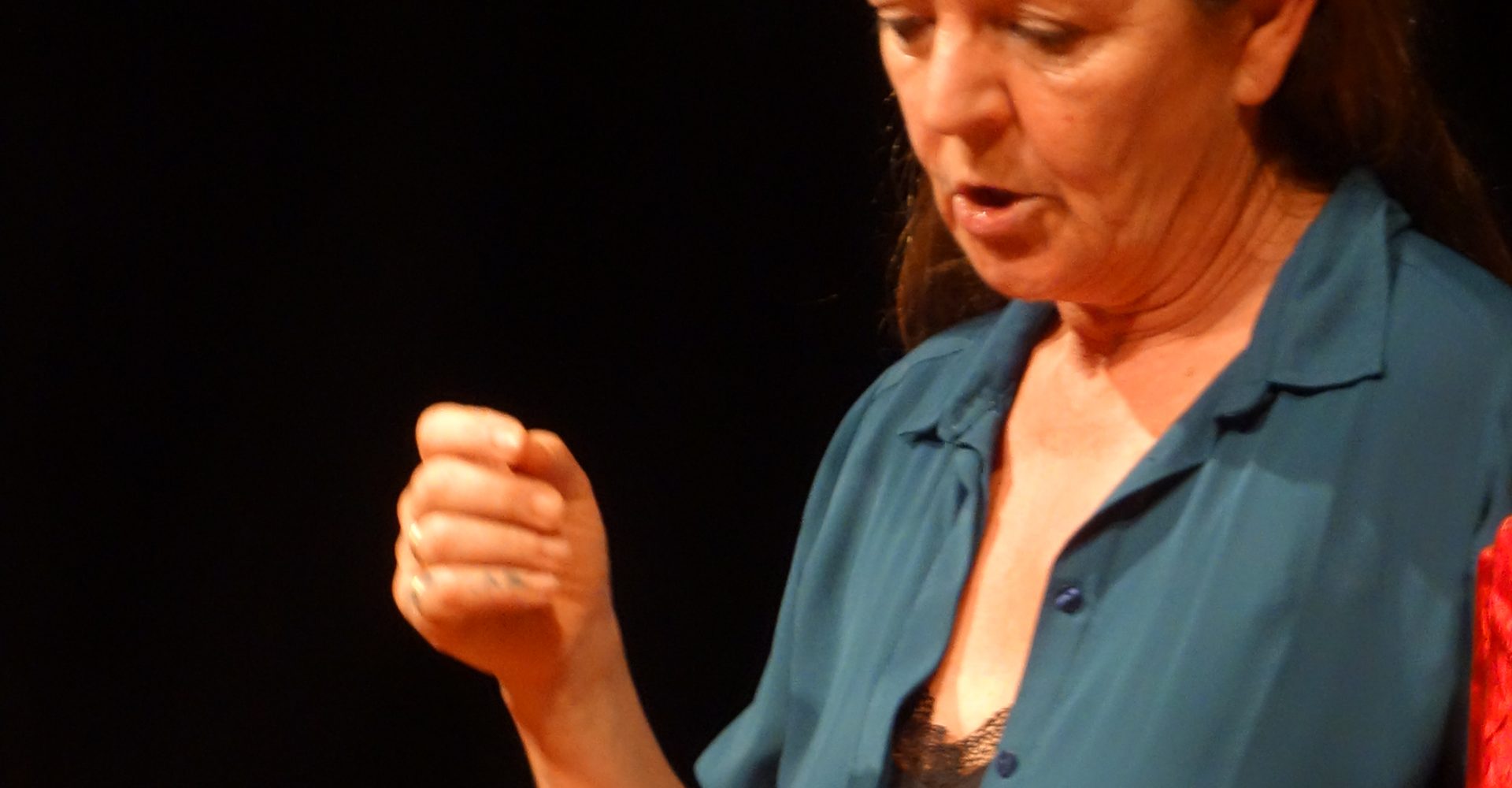Deep down

I cried because I understood
that I was saved,
I also cried because
I felt so different.
I was suddenly not interested
in being as popular
as these two girls,
having breasts
and being blond,
from the Big City or whatever
I imagined them to be.
I wanted to be myself.
If that was to be a character,
so be it.
When I was little they told me that I always had to be
different. It was not a compliment. They said that I had to
be something for myself; that what I had could not be
normal. When I now go back home where my parents still
live, my old friends say, knowing that I have worked with
theatre for many, many years, that they always knew that
something different would come out of me. Now it is a
compliment. Now that I have “made” it; made something
for myself, something to live for and from. Something
different from what they have. Them.
I always wanted to be like them. I wanted to be normal.
I wanted to fit in, to mix in with them, to just very naturally slide in among them, so that there could be no question as to whether I would take part in a game, or go somewhere or be selected as one of the first. I wanted to belong.
I was very small. I thought I would never be more than
one and a half metres tall. Never. I was very round. We
had very dark hair, and we were many – in my family.
I was not a good runner. I was not blond. I did not
belong to a family who gave their children, or their children’s friends, money to buy sweets. I was stubborn. I was
strange. I liked to read. I liked to eat. I liked to dare people
to do things; they would not and I had to dare myself. As a
result I became brave, or crazy, depending on the context.
I had two friends (sometimes three – if I happened to have
a new trinket, or something exciting to say).
One of them had no breasts like me, one of them stuttered, but sang, like me, and one of them lived very close
to me, and laughed a lot, like me. She was also crazy,
unusual.
We lived a usual unusual life in a Norwegian factory
town in the 1960s. Nothing happened after we quit
playing in the woods.
Before we started drinking.
The long waiting to become something or somebody
started – with how to dress, how to smile, how to attract
attention from the boys, how to walk, how to talk. A long
ride towards nothing, it seemed.
A long ride to get in.
Get in where?
I could see what would happen if I
stayed: start to work at the factory, quit
when I became pregnant, build a house.
Have a child. Vote for the Labour Party.
Being outside this pattern finally became
a possibility. To disagree, to not want to do,
to be different, to say no, to say “fuck you”.
(Not loud!)
What a character!
Looking back I must have been a lonely
young girl – a kind of shyness mistaken for
aloofness.
When I was thirteen years old, we visited my
grandmother further out on the fjord; we
were to stay there over the weekend. A relative from the Big City came with her girlfriend. They were a year older than me, they
were blond and they came from the city.
They had breasts too. I was still working on
reaching more than one and a half metres
and my chest was as flat as my back.
It was the first time we visited my grandmother without our parents.
In the cold winter night, we had my
grandmother’s permission to go and see some
“friends” who lived a few kilometres away.
We were dressed in miniskirts and nylon
stockings. The temperature was minus
fifteen degrees. We walked very quickly to
the house; it turned out to be a “home
alone” party and my relative went over and
pressed the bell. A boy opened the door and
looked at them and looked at me and said
“just a minute” and went inside and came
back and said to them that they were not
allowed to let so many people in, that only
she and her girlfriend, from the Big City,
could come in.
They came back to me and said that I
could not go inside, but that I had to wait
for them there since if I went home my
grandmother would get angry – so I was to
wait.
I waited.
I sincerely thought I was going to die. I
felt my legs go numb, I felt my nylon stockings freeze to my legs and thighs, and I lost
all feeling in the tip of my fingers. White
smoke came out of my mouth. The snow
creaked under my feet. I walked over to a
house under construction thinking it was
warmer there, that the roof would give me
some shelter.
I wanted to hide from the people occasionally coming out of the house or new
guests entering. They did not have any
problem in going inside. But they were also
much taller than I and had bumps in the
right places.
I felt like the little girl with the matchsticks.
I saw the warm yellow lights inside the
house, heard the music and the laughter.
I understood that I had entered the real
world. I understood that I was growing up. I
understood that not everywhere would be
like my parent’s home where you could
always enter, where my mother would always
ask if you were hungry or how it had gone at
school or something trivial like that. And I
swore to myself aloud in the cold winter
evening, with the white smoke coming out
from my mouth with every word, that I,
Geddy Aniksdal would never be like the
small-minded people in that house; that I
would never let anyone stand out in the
cold.
I thought they would never come out. I
also understood that their notion of time was
completely different from mine, since time
passes quickly in good company.
I do not remember how the night(mare)
ended. I remember walking home, my body
like a wooden stick, and I was praying that
my grandmother had left her old fashioned
storeroom open so that the kitchen would be
warm.
When we saw the lights of her house, I
was crying. I cried because I understood that
I was saved, I also cried because I felt so
different. I was suddenly not interested in
being as popular as these two girls, having
breasts and being blond, from the Big City
or whatever I imagined them to be. I wanted
to be myself. If that was to be a character, so
be it.
I did not get angry with them, did not
really blame them either, I
just felt myself sliding
away from them, as if we
were to be two small
canoes on the river. I felt
myself going upstream.
I felt a great power in
knowing something for
certain. Not what I
wanted, but what I did
not want. I believe that
many of my actions are a
reaction against, not a
specific drive towards.
My colleague Trond
and I often remember
that we did not start in our group especially
because we knew we would be actors, or for
a strong love of theatre. It was because of
the other people who were there, people we
trusted, people we could work with, people
that we could work up against.
We created our own work, our own
culture, our own theatre. I became us.
Walt Whitman says in one of his poems; “I
am many, I contain multitudes”. Working
in theatre rewards me with the search for
my own character, my characters, which are
always a “me”, one of the many “me”s, challenging aspects and qualities of “me” in
each different work.
If I myself cannot come along, I lose
interest and fade quickly. To say it with one
of my many “me”s, one of my characters, one
of the dreamers in The Dreamers:
I have perceived that to be with those I like
is enough,
To stop in company with the rest in the evening
is enough,
To be surrounded by beautiful, curious,
breathing, laughing flesh is enough,
To pass among them – to touch any one –
to rest my arm ever so lightly
round his or her neck
for a moment –
what is this then?
I do not ask any more delight –
I swim in it as in a sea.
There is something in staying
close to men and women
and looking –
on them and in the contact
and odour of them that
pleases the soul well,
All things please the soul,
but these please the soul well.
Walt Whitman,
Leaves of Grass, I Sing the Body Electric
I have carried these lines with me for the last
thirteen years. I know them by heart, and I
say them, sometimes, in good company. As
for my characters, I am their carrier, and it
might be just as much a question of character
as a character itself. It just boils down to what
I do.
Some character!







